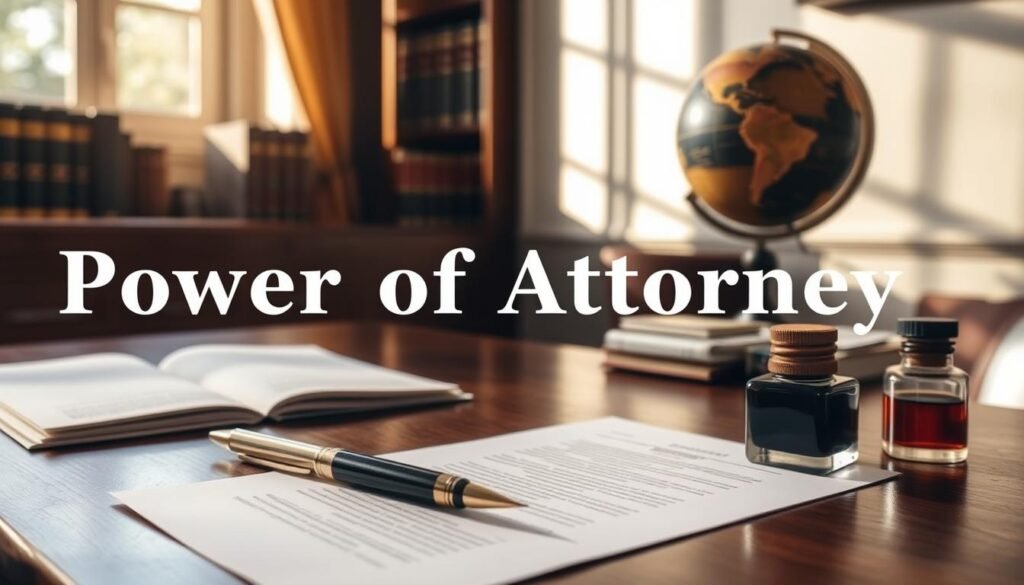Power of attorney (POA) is a key legal document. It lets one person, called the agent or attorney-in-fact, make financial and legal choices for another, the principal. This is often used when the principal can’t handle their affairs themselves.
The POA can be tailored to fit the principal’s needs. They can decide what powers their agent will have. This makes sure the agent acts in the principal’s best interest.
Agents must act with the principal’s best interests in mind. They should not have any personal interests that could conflict with the principal’s. It’s important to know that “incapacitation” means the principal can’t make decisions for themselves.
POA can be taken back by the principal or ended in other ways. This includes if the principal dies or a court decides to end it.
Key Takeaways
- Power of attorney (POA) is a legal document that grants an agent the authority to make decisions on behalf of the principal.
- POA is commonly used when the principal is unable to manage their own affairs due to incapacitation or absence.
- The scope of authority granted by POA is customizable, allowing principals to specify the powers given to their agents.
- Agents have a fiduciary duty to act in the principal’s best interests and avoid conflicts of interest.
- POA can be revoked by the principal or terminated in other ways, such as the principal’s death or court intervention.
What is a Power of Attorney?
A power of attorney (POA) is a legal document that lets someone choose a trusted person to handle their affairs. This is helpful when the person giving the power, called the principal, can’t make decisions themselves. This could be because they’re sick, away, or unable to do so for other reasons.
Definition and Overview
The power of attorney lets the chosen person, or agent, make decisions for the principal. They can handle money, property, and even health care choices. The agent must always act in the principal’s best interest and not for their own gain.
This document can be tailored to fit the principal’s needs. It’s useful for anyone, from a young entrepreneur to someone planning a long trip. Knowing about the different types of power of attorney helps protect one’s rights and wishes, even when they can’t speak for themselves.
| Key Terms | Definition |
|---|---|
| Power of Attorney | A legal document that grants an individual (the agent or attorney-in-fact) the authority to act on behalf of the person granting the power (the principal). |
| Agent or Attorney-in-Fact | The individual designated by the principal to manage their affairs on their behalf. |
| Principal | The person granting the power of attorney to the agent or attorney-in-fact. |
| Fiduciary Duty | The legal obligation of the agent to act in the best interests of the principal and avoid conflicts of interest. |
Types of Power of Attorney
There are many types of power of attorney, each for different legal and financial needs. Knowing the differences is key to protecting your rights. Let’s look at the main types: limited, general, durable, and springing.
Limited or Special Power of Attorney
A limited power of attorney lets the agent handle specific tasks. This could be selling property or managing a certain financial account. It’s designed for a specific need and limits the agent’s actions.
General Power of Attorney
A general power of attorney gives the agent wide-ranging financial powers. They can manage bank accounts, make investment choices, and even file taxes. It’s a broad authority.
Durable Power of Attorney
A durable power of attorney stays in effect even if the principal can’t make decisions. It’s crucial for those who might face health or cognitive issues later.
Springing Power of Attorney
A springing power of attorney kicks in only when the principal can’t make decisions. It’s a safety net, allowing the agent to take over when needed.
It’s vital to understand these power of attorney types. This knowledge helps protect your legal and financial well-being. Talking to a lawyer can help choose the right one for you.

General Power of Attorney
A general power of attorney is a legal document that gives someone, called an agent, the power to act for you. This document lets the agent handle many financial actions. They can manage bank accounts, sign checks, and even buy or sell property. The agent can do almost anything you could do, except for a few things listed in the document.
Having a general power of attorney is convenient but also risky. The agent must act in your best interest, following fiduciary duty. But, there’s a chance they might make mistakes or do things without your permission. It’s very important to choose someone you trust and who is capable of handling your finances.
This type of power of attorney stays in effect until you pass away. This means the agent can keep managing your money even when you can’t. It’s a way to ensure your financial affairs are taken care of, even after you’re gone.
| Key Characteristics of a General Power of Attorney |
|---|
|
Limited or Special Power of Attorney
For managing specific parts of your life, a limited power of attorney or special power of attorney might be perfect. These options let your trusted agent handle certain tasks for you. This way, your interests stay safe even when you can’t do things yourself.
Scope and Restrictions
A limited power of attorney or special power of attorney is great for tasks like selling property or managing money while you’re away. Your agent’s job is clearly set, with rules on what they can do and when. This keeps you safe from unwanted actions, offering a secure way to manage your affairs.
| Type of Power of Attorney | Scope | Restrictions |
|---|---|---|
| Limited Power of Attorney | Specific matters or isolated transactions | Clearly defined time frames and tasks |
| Special Power of Attorney | Specific matters or events | Restrictions on the agent’s authority |
At Heritance Law, we know how important it is to make your limited power of attorney or special power of attorney fit your needs. Our team will help you every step of the way. We make sure your wishes are clear and your assets are safe, no matter what.
Durable Power of Attorney
A durable power of attorney is a key legal document. It stays in effect even if the person who made it can’t make decisions. This is especially important during medical emergencies when someone might not be able to decide for themselves.
This type of power of attorney is supported by the Uniform Power of Attorney Act in many places. It helps prepare for times when someone can’t make decisions on their own. Choosing a reliable and smart agent is very important. They should have the power to handle all sorts of situations, from money matters to health choices.
It’s a good idea to talk to a lawyer when making a durable power of attorney. This makes sure the document reflects the person’s wishes and follows the law. By doing this, people can make sure their affairs are taken care of, even if they can’t make decisions themselves.
| Key Features of Durable Power of Attorney | Benefits |
|---|---|
|
|
Understanding the durable power of attorney’s features and benefits is important. It helps protect a person’s interests and ensures their Heritance Law is followed, even when they can’t make decisions. This document is a key part of a complete estate plan. It provides the continuity and incapacity protection needed to keep someone’s affairs safe.
Springing Power of Attorney
A springing power of attorney is a key part of estate planning. It kicks in only when the person making it, called the principal, can’t make decisions anymore. This is different from a general power of attorney, which starts right away.
Activation and Considerations
One big plus of a springing power of attorney is that it lets the principal keep control until they can’t anymore. But, it also brings up some tricky legal and medical issues that need thought.
- Defining the criteria for incapacity: It’s crucial to clearly say what will make the power of attorney start. This makes sure the transfer of power goes smoothly and avoids family fights.
- Addressing competence disputes: If people disagree about the principal’s ability to make decisions, it could lead to court. Talking to doctors and potential agents ahead of time can help avoid this.
- Navigating legal and medical considerations: The mix of legal and medical stuff in a springing power of attorney can be tough. Making sure the document is right and everyone knows their part is key.
Thinking about a springing power of attorney means weighing its good points against the possible problems. Good planning, clear talk, and knowing about Heritance Law and competence disputes can make the transition smoother when the principal can’t make decisions anymore.
Conclusion
Power of attorney is a key tool that brings peace of mind. It helps manage one’s affairs smoothly. It comes in different types, each for specific needs.
For example, a limited power of attorney handles certain transactions. A general power of attorney gives more authority. And a springing power of attorney kicks in when needed.
The medical power of attorney is especially important. It lets someone make health decisions for you. Choosing a trustworthy agent is just as important as the document itself.
When we plan our estate, knowing about power of attorney is crucial. It ensures our wishes are followed, even when we can’t make decisions ourselves.
Using estate planning and the right legal document is vital. It protects our Heritance Law and gives us peace of mind. By understanding the different types of power of attorney, we can make choices that fit our needs.

